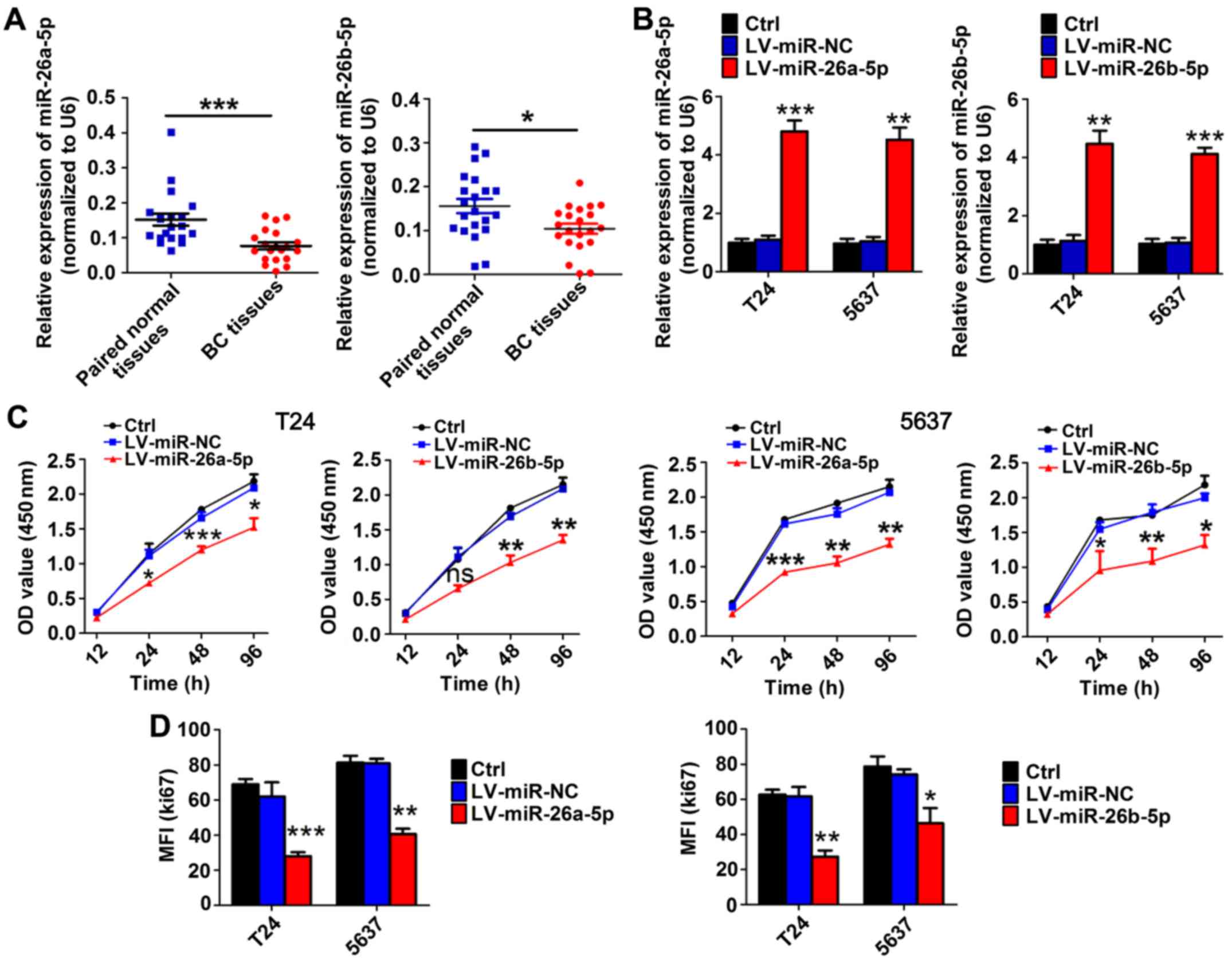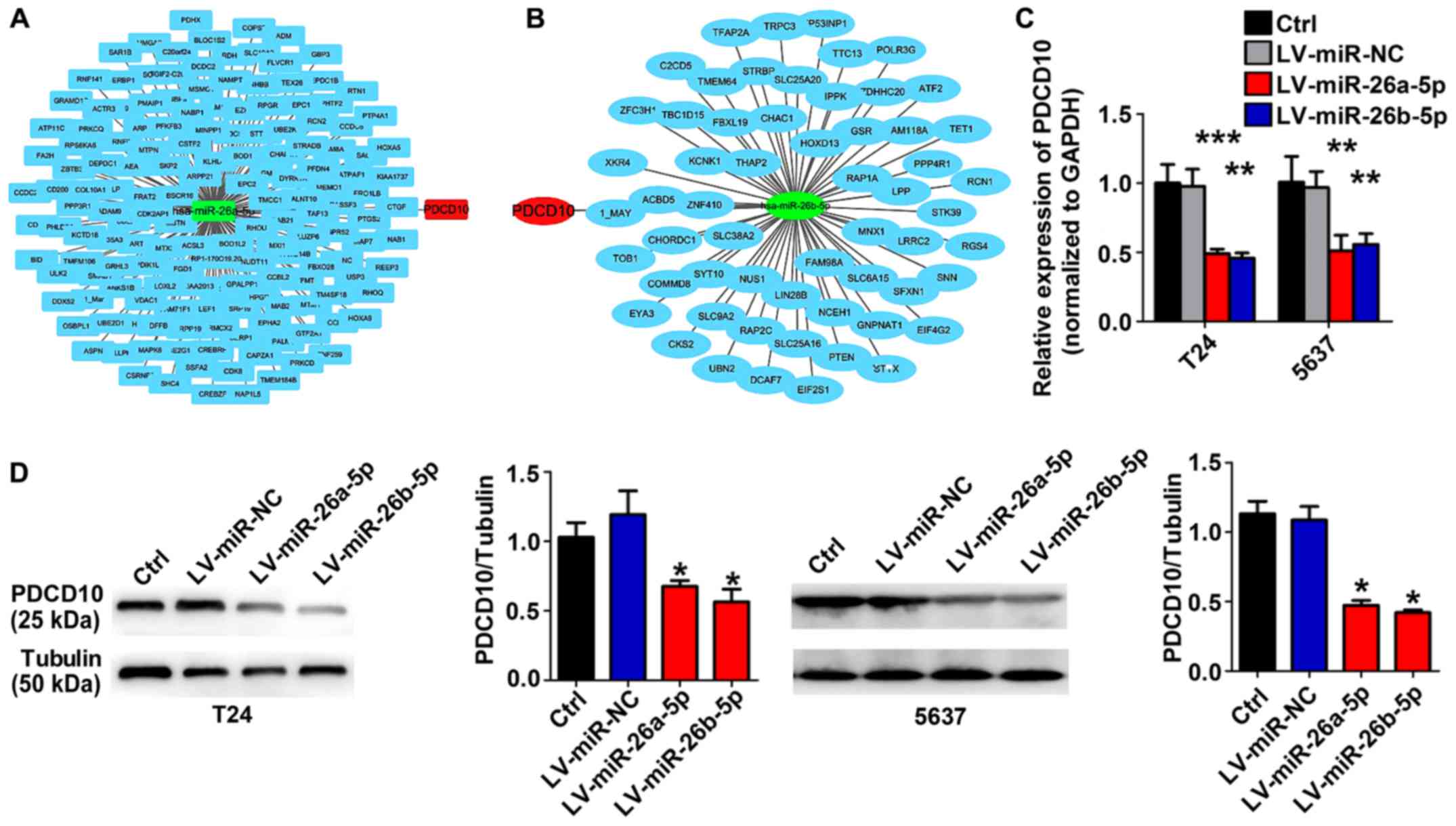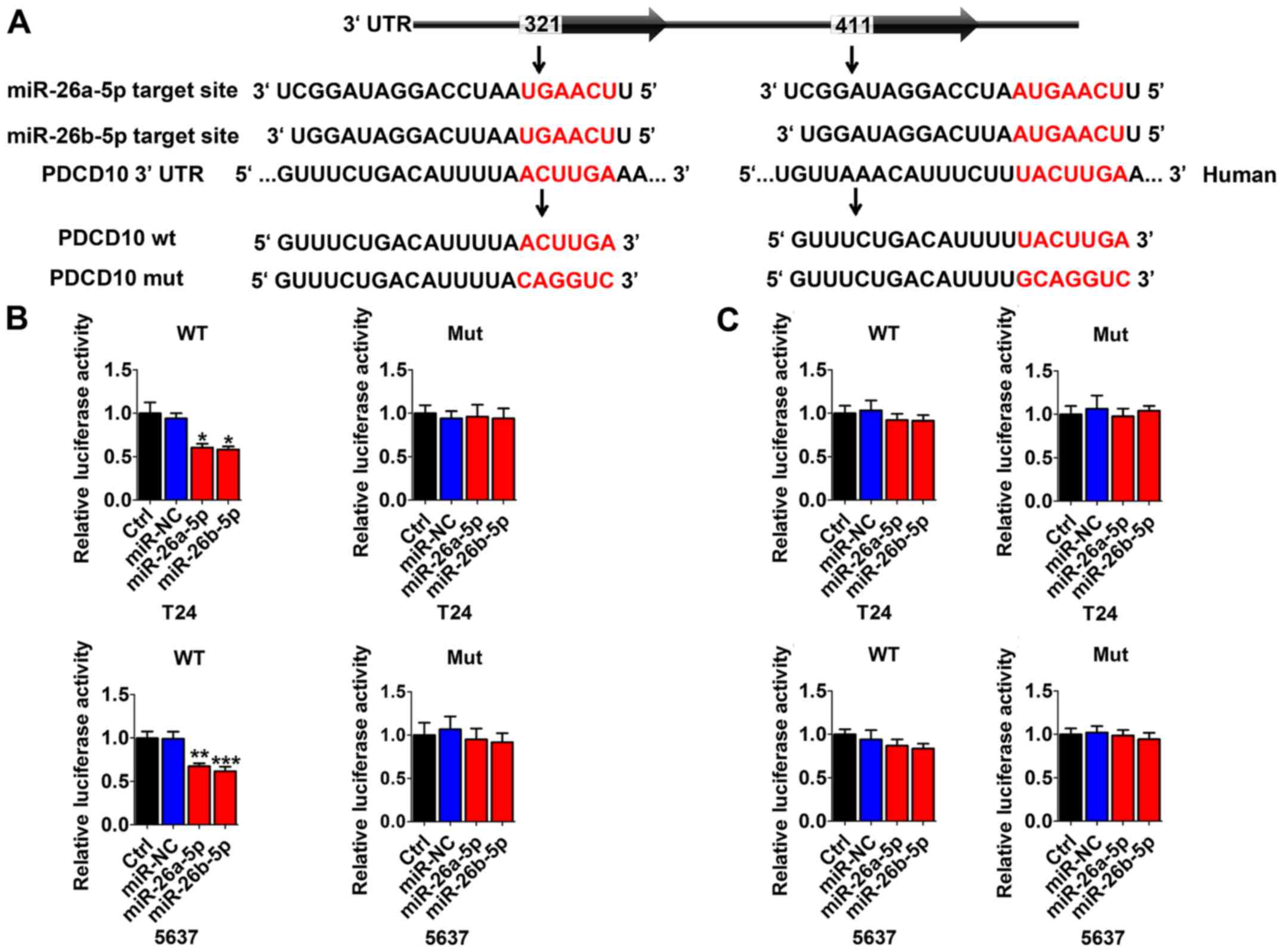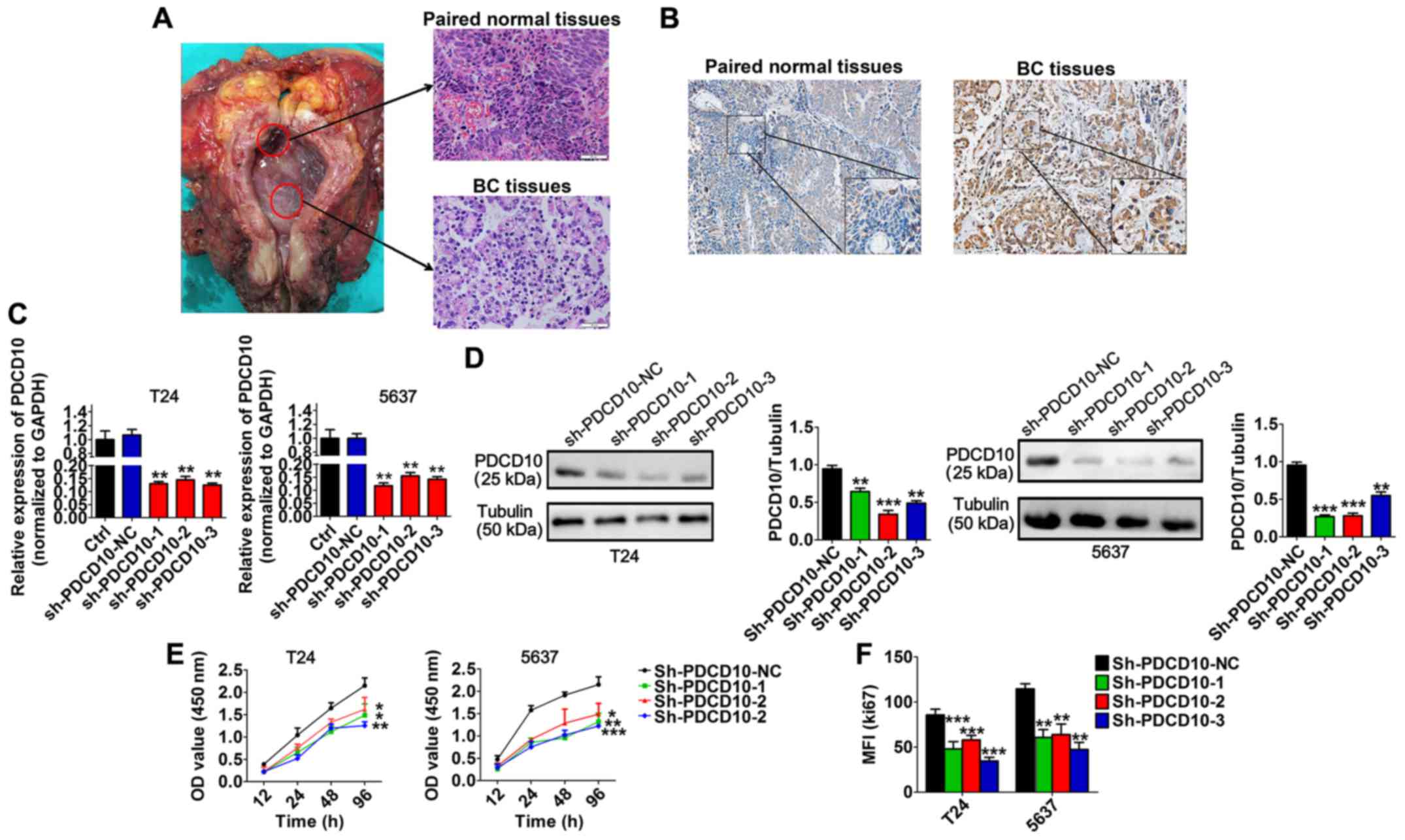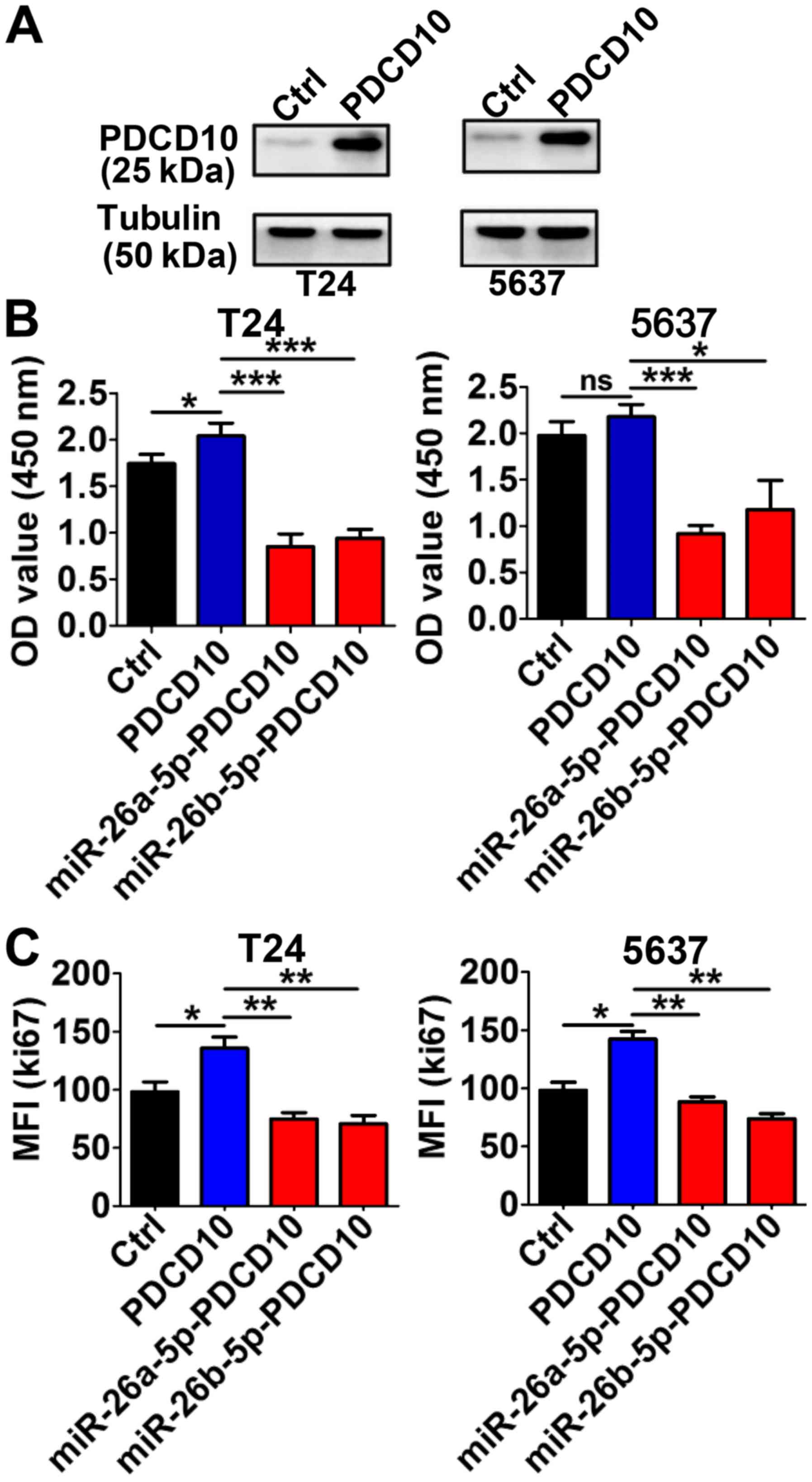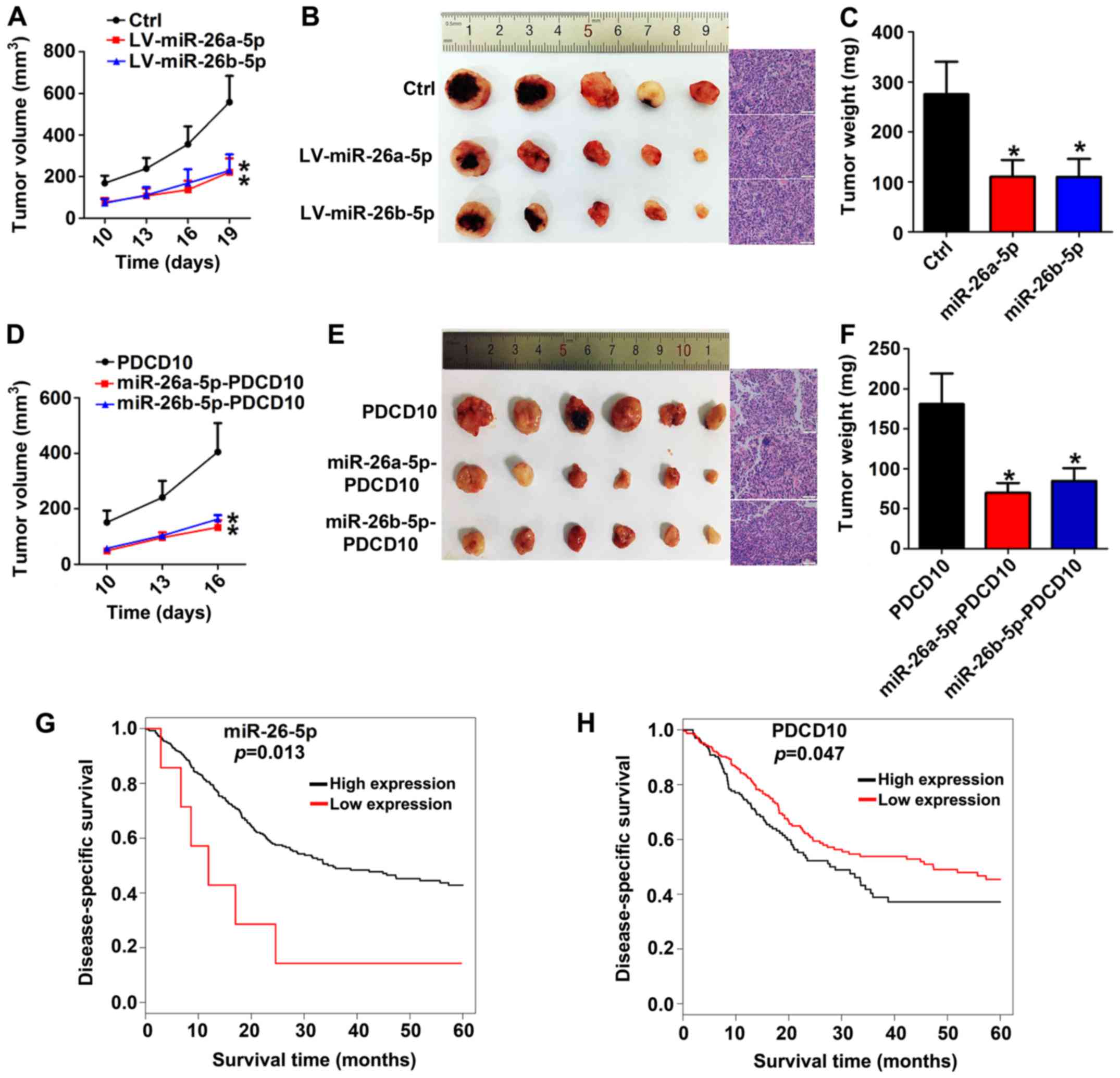|
1
|
Siegel RL, Miller KD and Jemal A: Cancer
statistics, 2017. CA Cancer J Clin. 66:7–30. 2016. View Article : Google Scholar : PubMed/NCBI
|
|
2
|
Barton MK: High morbidity and mortality
found for high-risk, non-muscle-invasive bladder cancer. CA Cancer
J Clin. 63:371–372. 2013. View Article : Google Scholar : PubMed/NCBI
|
|
3
|
Comprehensive molecular characterization
of urothelial bladder carcinoma. Nature. 507:315–322. 2014.
View Article : Google Scholar : PubMed/NCBI
|
|
4
|
Bartel DP: MicroRNAs: Target recognition
and regulatory functions. Cell. 136:215–233. 2009. View Article : Google Scholar : PubMed/NCBI
|
|
5
|
Bartel DP: MicroRNAs: Genomics,
biogenesis, mechanism, and function. Cell. 116:281–297. 2004.
View Article : Google Scholar : PubMed/NCBI
|
|
6
|
Ma L, Xu Z, Xu C and Jiang X:
MicroRNA-148a represents an independent prognostic marker in
bladder cancer. Tumour Biol. 37:7915–7920. 2016. View Article : Google Scholar : PubMed/NCBI
|
|
7
|
Liu D, Li Y, Luo G, Xiao X, Tao D, Wu X,
Wang M, Huang C, Wang L, Zeng F, et al: LncRNA SPRY4-IT1 sponges
miR-101-3p to promote proliferation and metastasis of bladder
cancer cells through up-regulating EZH2. Cancer Lett. 388:281–291.
2017. View Article : Google Scholar : PubMed/NCBI
|
|
8
|
Wang Y, Sun B, Zhao X, Zhao N, Sun R, Zhu
D, Zhang Y, Li Y, Gu Q, Dong X, et al: Twist1-related miR-26b-5p
suppresses epithelial-mesenchymal transition, migration and
invasion by targeting SMAD1 in hepatocellular carcinoma.
Oncotarget. 7:24383–24401. 2016.PubMed/NCBI
|
|
9
|
Miyamoto K, Seki N, Matsushita R, Yonemori
M, Yoshino H, Nakagawa M and Enokida H: Tumour-suppressive
miRNA-26a-5p and miR-26b-5p inhibit cell aggressiveness by
regulating PLOD2 in bladder cancer. Br J Cancer. 115:354–363. 2016.
View Article : Google Scholar : PubMed/NCBI
|
|
10
|
Lin C, Meng S, Zhu T and Wang X:
PDCD10/CCM3 acts downstream of {gamma}-protocadherins to regulate
neuronal survival. J Biol Chem. 285:41675–41685. 2010. View Article : Google Scholar : PubMed/NCBI
|
|
11
|
Stamatovic SM, Sladojevic N, Keep RF and
Andjelkovic AV: PDCD10 (CCM3) regulates brain endothelial barrier
integrity in cerebral cavernous malformation type 3: Role of
CCM3-ERK1/2-cortactin cross-talk. Acta Neuropathol. 130:731–750.
2015. View Article : Google Scholar : PubMed/NCBI
|
|
12
|
Zhang H, Ma X, Peng S, Nan X and Zhao H:
Differential expression of MST4, STK25 and PDCD10 between benign
prostatic hyperplasia and prostate cancer. Int J Clin Exp Pathol.
7:8105–8111. 2014.PubMed/NCBI
|
|
13
|
Lauenborg B, Kopp K, Krejsgaard T, Eriksen
KW, Geisler C, Dabelsteen S, Gniadecki R, Zhang Q, Wasik MA,
Woetmann A, et al: Programmed cell death-10 enhances proliferation
and protects malignant T cells from apoptosis. APMIS. 118:719–728.
2010. View Article : Google Scholar : PubMed/NCBI
|
|
14
|
Sobin LH and Compton CC: TNM seventh
edition: What's new, what's changed: Communication from the
international union against cancer and the American Joint Committee
on Cancer. Cancer. 116:5336–5339. 2010. View Article : Google Scholar : PubMed/NCBI
|
|
15
|
Cui X, Shen D, Kong C, Zhang Z, Zeng Y,
Lin X and Liu X: NF-κB suppresses apoptosis and promotes bladder
cancer cell proliferation by upregulating survivin expression in
vitro and in vivo. Sci Rep. 7:407232017. View Article : Google Scholar : PubMed/NCBI
|
|
16
|
Sudarshan S, Holman DH, Hyer ML,
Voelkel-Johnson C, Dong JY and Norris JS: In vitro efficacy of Fas
ligand gene therapy for the treatment of bladder cancer. Cancer
Gene Ther. 12:12–18. 2005. View Article : Google Scholar : PubMed/NCBI
|
|
17
|
Livak KJ and Schmittgen TD: Analysis of
relative gene expression data using real-time quantitative PCR and
the 2−ΔΔCT method. Methods. 25:402–408. 2001.
View Article : Google Scholar : PubMed/NCBI
|
|
18
|
Lin H, Liu W, Fang Z, Liang X, Li J, Bai
Y, Lin L, You H, Pei Y, Wang F, et al: Overexpression of DHX32
contributes to the growth and metastasis of colorectal cancer. Sci
Rep. 5:92472015. View Article : Google Scholar : PubMed/NCBI
|
|
19
|
Yang R, Liu M, Liang H, Guo S, Guo X, Yuan
M, Lian H, Yan X, Zhang S, Chen X, et al: miR-138-5p contributes to
cell proliferation and invasion by targeting Survivin in bladder
cancer cells. Mol Cancer. 15:822016. View Article : Google Scholar : PubMed/NCBI
|
|
20
|
Kato M, Goto Y, Matsushita R, Kurozumi A,
Fukumoto I, Nishikawa R, Sakamoto S, Enokida H, Nakagawa M,
Ichikawa T, et al: MicroRNA-26a/b directly regulate La-related
protein 1 and inhibit cancer cell invasion in prostate cancer. Int
J Oncol. 47:710–718. 2015. View Article : Google Scholar : PubMed/NCBI
|
|
21
|
Fu X, Meng Z, Liang W, Tian Y, Wang X, Han
W, Lou G, Wang X, Lou F, Yen Y, et al: miR-26a enhances miRNA
biogenesis by targeting Lin28B and Zcchc11 to suppress tumor growth
and metastasis. Oncogene. 33:4296–4306. 2014. View Article : Google Scholar : PubMed/NCBI
|
|
22
|
Fukumoto I, Kikkawa N, Matsushita R, Kato
M, Kurozumi A, Nishikawa R, Goto Y, Koshizuka K, Hanazawa T,
Enokida H, et al: Tumor-suppressive microRNAs (miR-26a/b,
miR-29a/b/c and miR-218) concertedly suppressed
metastasis-promoting LOXL2 in head and neck squamous cell
carcinoma. J Hum Genet. 61:109–118. 2016. View Article : Google Scholar : PubMed/NCBI
|
|
23
|
Tian L, Fang YX, Xue JL and Chen JZ: Four
microRNAs promote prostate cell proliferation with regulation of
PTEN and its downstream signals in vitro. PLoS One. 8:e758852013.
View Article : Google Scholar : PubMed/NCBI
|
|
24
|
Icli B, Dorbala P and Feinberg MW: An
emerging role for the miR-26 family in cardiovascular disease.
Trends Cardiovasc Med. 24:241–248. 2014. View Article : Google Scholar : PubMed/NCBI
|
|
25
|
Fareh M, Yeom KH, Haagsma AC, Chauhan S,
Heo I and Joo C: TRBP ensures efficient Dicer processing of
precursor microRNA in RNA-crowded environments. Nat Commun.
7:136942016. View Article : Google Scholar : PubMed/NCBI
|
|
26
|
Meng X, Li X, Zhang P, Wang J, Zhou Y and
Chen M: Circular RNA: An emerging key player in RNA world. Brief
Bioinform. 18:547–557. 2017.PubMed/NCBI
|
|
27
|
Cui X, Kong C, Zhu Y, Zeng Y, Zhang Z, Liu
X, Zhan B, Piao C and Jiang Z: miR-130b, an onco-miRNA in bladder
cancer, is directly regulated by NF-κB and sustains NF-κB
activation by decreasing Cylindromatosis expression. Oncotarget.
7:48547–48561. 2016. View Article : Google Scholar : PubMed/NCBI
|
|
28
|
Nahvi A, Shoemaker CJ and Green R: An
expanded seed sequence definition accounts for full regulation of
the hid 3′ UTR by bantam miRNA. RNA. 15:814–822. 2009. View Article : Google Scholar : PubMed/NCBI
|
|
29
|
Xu X, Ge S, Jia R, Zhou Y, Song X, Zhang H
and Fan X: Hypoxia-induced miR-181b enhances angiogenesis of
retinoblastoma cells by targeting PDCD10 and GATA6. Oncol Rep.
33:2789–2796. 2015. View Article : Google Scholar : PubMed/NCBI
|
|
30
|
Wu Z, Qi Y, Guo Z, Li P and Zhou D:
miR-613 suppresses ischemia-reperfusion-induced cardiomyocyte
apoptosis by targeting the programmed cell Death 10 gene. Biosci
Trends. 10:251–257. 2016. View Article : Google Scholar : PubMed/NCBI
|
|
31
|
Chen PY, Chang WS, Chou RH, Lai YK, Lin
SC, Chi CY and Wu CW: Two non-homologous brain diseases-related
genes, SERPINI1 and PDCD10, are tightly linked by an asymmetric
bidirectional promoter in an evolutionarily conserved manner. BMC
Mol Biol. 8:22007. View Article : Google Scholar : PubMed/NCBI
|
|
32
|
You C, Sandalcioglu IE, Dammann P, Felbor
U, Sure U and Zhu Y: Loss of CCM3 impairs DLL4-Notch signalling:
Implication in endothelial angiogenesis and in inherited cerebral
cavernous malformations. J Cell Mol Med. 17:407–418. 2013.
View Article : Google Scholar : PubMed/NCBI
|
|
33
|
Lambertz N, El HN, Kreitschmann-Andermahr
I, Stein KP, Dammann P, Oezkan N, Mueller O, Sure U and Zhu Y:
Downregulation of programmed cell death 10 is associated with tumor
cell proliferation, hyperangiogenesis and peritumoral edema in
human glioblastoma. BMC Cancer. 15:7592015. View Article : Google Scholar : PubMed/NCBI
|
|
34
|
Kamath RS, Fraser AG, Dong Y, Poulin G,
Durbin R, Gotta M, Kanapin A, Le Bot N, Moreno S, Sohrmann M, et
al: Systematic functional analysis of the Caenorhabditis elegans
genome using RNAi. Nature. 421:231–237. 2003. View Article : Google Scholar : PubMed/NCBI
|
|
35
|
Stockton RA, Shenkar R, Awad IA and
Ginsberg MH: Cerebral cavernous malformations proteins inhibit Rho
kinase to stabilize vascular integrity. J Exp Med. 207:881–896.
2010. View Article : Google Scholar : PubMed/NCBI
|
|
36
|
Zhu Y, Zhao K, Prinz A, Keyvani K,
Lambertz N, Kreitschmann-Andermahr I, Lei T and Sure U: Loss of
endothelial programmed cell death 10 activates glioblastoma cells
and promotes tumor growth. Neuro Oncol. 18:538–548. 2016.
View Article : Google Scholar : PubMed/NCBI
|
|
37
|
He Y, Zhang H, Yu L, Gunel M, Boggon TJ,
Chen H and Min W: Stabilization of VEGFR2 signaling by cerebral
cavernous malformation 3 is critical for vascular development. Sci
Signal. 3:ra262010. View Article : Google Scholar : PubMed/NCBI
|
|
38
|
Tian R, Yang S, Zhu Y, Zou S, Li P, Wang
J, Zhu Z, Huang Y, He Z and Li Z: VEGF/VEGFR2 signaling
regulates germ cell proliferation in vitro and promotes mouse
testicular regeneration in vivo. Cells Tissues Organs. 201:1–13.
2016. View Article : Google Scholar : PubMed/NCBI
|
|
39
|
Ma X, Zhao H, Shan J, Long F, Chen Y, Chen
Y, Zhang Y, Han X and Ma D: PDCD10 interacts with Ste20-related
kinase MST4 to promote cell growth and transformation via
modulation of the ERK pathway. Mol Biol Cell. 18:1965–1978. 2007.
View Article : Google Scholar : PubMed/NCBI
|
|
40
|
Riverso M, Montagnani V and Stecca B: KLF4
is regulated by RAS/RAF/MEK/ERK signaling through E2F1 and promotes
melanoma cell growth. Oncogene. 36:3322–3333. 2017. View Article : Google Scholar : PubMed/NCBI
|
|
41
|
Voss K, Stahl S, Schleider E, Ullrich S,
Nickel J, Mueller TD and Felbor U: CCM3 interacts with CCM2
indicating common pathogenesis for cerebral cavernous
malformations. Neurogenetics. 8:249–256. 2007. View Article : Google Scholar : PubMed/NCBI
|
|
42
|
Fidalgo M, Fraile M, Pires A, Force T,
Pombo C and Zalvide J: CCM3/PDCD10 stabilizes GCKIII proteins to
promote Golgi assembly and cell orientation. J Cell Sci.
123:1274–1284. 2010. View Article : Google Scholar : PubMed/NCBI
|















